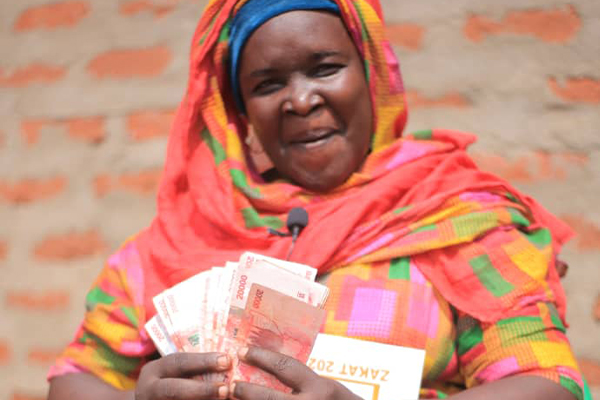Zakat: Understanding Its Pillars and Impact

Zakat - derived from the Arabic word meaning ‘purification’ or ‘growth’ - is one of the Five Pillars of Islam. It is a sacred obligation with deep spiritual significance and powerful social impact. Through Zakat, Muslims purify their wealth and support those in need, strengthening both individual faith and the wider community.
What Is Zakat?
Zakat (Zakāt al‑Māl) is an annual charitable obligation that requires Muslims to give a fixed portion - usually 2.5% - of their qualifying wealth to eligible recipients. More than just a charitable act, it is an act of worship that purifies wealth and nurtures compassion, empathy, and social responsibility. Paying zakat serves to remind Muslims that all wealth ultimately belongs to Allah (سُبْحَانَهُ وَتَعَالَى).
What Is the Nisab (Threshold for Paying Zakat)?
Zakat is only required if a Muslim owns wealth above a certain threshold, known as the nisab. The Prophet (ﷺ) set the nisab threshold to be equivalent to 87.48 grams of gold and 612.36 grams of silver.
If a person’s wealth equals or exceeds the nisab value and remains at or above that level for one full lunar year (hawl), they are obligated to pay Zakat. Those with wealth below the nisab are not required to pay Zakat but are encouraged to give voluntary charity (sadaqah).
How Is Zakat Calculated?
Zakat is typically 2.5% of a person’s qualifying assets held over one lunar year. Qualifying assets include:
Cash and savings
Gold and silver
Business inventory or stock
Investments (e.g., shares, pensions)
Rental income and other profit-generating assets
Debts you owe can be deducted from your total wealth before calculating Zakat. Tools like our Zakat Calculator make this process much simpler.
What Are the Types of Zakat?
Zakat al-Māl
This is the regular, annual zakat paid on wealth, savings, business assets, and investments. It is the most commonly observed form of Zakat.
Zakat al-Fitr
This is a small, fixed amount of charity given by every Muslim at the end of Ramadan - before the Eid prayer. It ensures that even the poorest members of society can celebrate Eid and partake in the festivities.
Who Can Receive Zakat?
The Holy Qur’an outlines eight categories of people who are eligible to receive Zakat:
The poor
The destitute
Administrators/collectors of Zakat
New Muslims facing hardship
To free slaves
Those who are unable to pay their debt
In the path of Allah (سُبْحَانَهُ وَتَعَالَى)
Travellers who cannot afford to return home
It is essential that Zakat is distributed ethically and responsibly to one or more of these eligible groups. By giving with Penny Appeal, 100% of your Zakat goes to the less fortunate. Every single penny is spent on those in need, giving you 100% of the rewards.
The Spiritual and Social Impact of Zakat
Spiritual Growth
Zakat purifies the soul from greed and selfishness. It fosters humility, generosity, and spiritual awareness. Giving Zakat is an act of obedience to Allah (سُبْحَانَهُ وَتَعَالَى) and a means of growing closer to Him.
Social Justice
Zakat redistributes wealth in a just and fair way. It provides a safety net for the vulnerable and helps reduce social and economic inequality.
Poverty Relief and Empowerment
Zakat funds essential services such as food, housing, healthcare, and education. It supports orphans, widows, and refugees, offering relief and opportunities for a better life.
Global Economic Impact
It is estimated that Zakat globally could raise hundreds of billions each year. When collected and distributed effectively, it has the power to transform societies, reduce poverty on a massive scale, and promote long-term development.
How to Pay Zakat – Best Practices
Mark the Date
Keep track of your Zakat anniversary each lunar year. Many Muslims choose to pay during Ramadan due to the increased spiritual rewards, but it can be paid at any time.
Calculate Accurately
Use tools like our online Zakat Calculator to assess your wealth, deductions, and Zakat due with ease and accuracy.
Give Transparently
Ensure your Zakat is given through a trustworthy organisation that adheres to Islamic principles and delivers your donations ethically and efficiently, such as Penny Appeal.
Keep Records
Document your Zakat payments year by year for accountability and to ensure any missed payments are fulfilled later if needed.
Challenges and Opportunities in Zakat Today
While Zakat has the potential to be a powerful tool for change, challenges exist. In some regions, Zakat collection and distribution lack structure, transparency, or reach. Modern Islamic charities, like Penny Appeal, are working to change that - ensuring zakat is collected and used in the most impactful and ethical ways possible.
There is also growing interest in integrating zakat with global development efforts such as the UN Sustainable Development Goals (SDGs). With strong systems and good governance, Zakat can help build resilient communities and a more equitable world.
Zakat is more than a financial obligation; it is a pillar of faith, a social equaliser, and a powerful tool for positive change. It purifies wealth, strengthens communities, and ensures that no one is left behind.
At Penny Appeal, we are committed to helping Muslims fulfil their Zakat duty with confidence and compassion. Every penny you give helps support those in desperate need - whether they are orphans, refugees, or families struggling to survive.
Give Your Zakat with Penny Appeal
Ready to make a difference? Use our Zakat Calculator and donate today. Purify your wealth, uplift lives, and earn reward from Allah (سُبْحَانَهُ وَتَعَالَى)
MONDAY 30 JUN 2025
